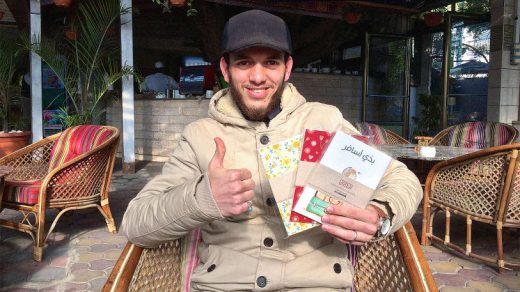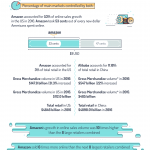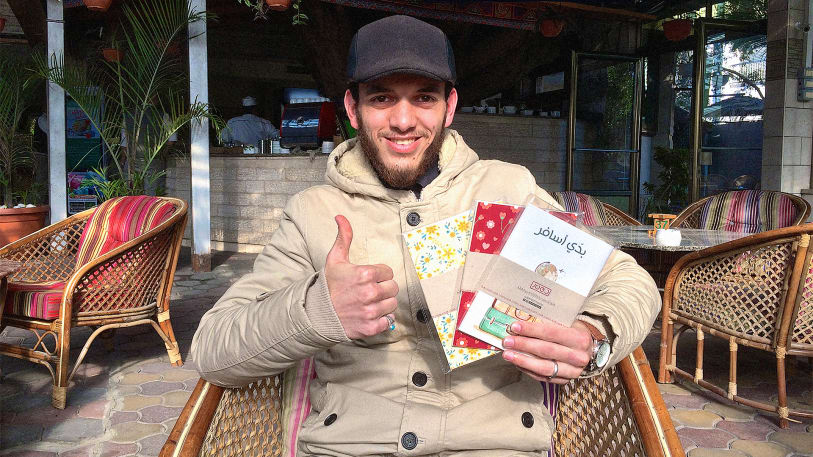Young Entrepreneurs Are Using Instagram To Bring E-Commerce To Gaza
If you want a personalized notebook in the Gaza Strip these days, 24-year-old Mohammed Hammed is your guy. The Islamic law student and self-taught graphic designer runs Dfter, the coastal enclave’s first and only hand-designed notebook business, offering pads personalized with the print, name, or saying of your choice on the cover.
“I decided to use my design talent to start my own business rather than waiting for a job in the government, as there are no jobs or salaries,” he tells Fast Company.
And like many entrepreneurs in Gaza–where a staggering 58% of young people and 40% of adults are unemployed, according to the World Bank–Hammed runs his business through Instagram and Facebook. Social media-based business is a worldwide trend, but it’s of particular import in war-ravaged Gaza, which since 2007 has been besieged by an Israeli and Egyptian blockade and the heavy-handed rule of the Islamist Hamas. Palestinians can’t simply import or export a product from anywhere in the world, as the typical e-commerce model envisions. So instead people are creating their own internet-based domestic economies through social media, at once connected and disconnected from markets outside of Gaza.
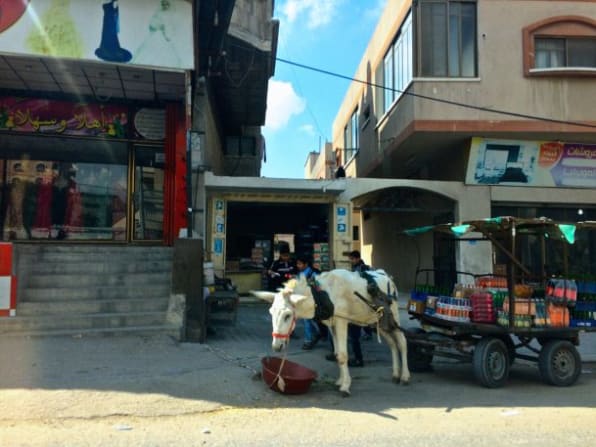
The daily stakes are high. The United Nations recently warned that by 2020 Gaza could be “uninhabitable” for its 1.6 million residents if current crisis-level economic and humanitarian trends continue due to the lack of work and basics like infrastructure and health services. The territory has yet to recover from the devastating 2014 war between Israel and Hamas, the third in 10 years. With relations still on edge, residents worry if they can survive another onslaught.
People like Hammed can’t afford rent for a shop and can’t build their own because of Israel’s restrictions on construction materials (which can be used for building both homes and tunnels). A traditional business also requires electricity, which only works six to eight hours a day in Gaza because of power shortages, and walk-in customers are less common when the streets are dangerous.
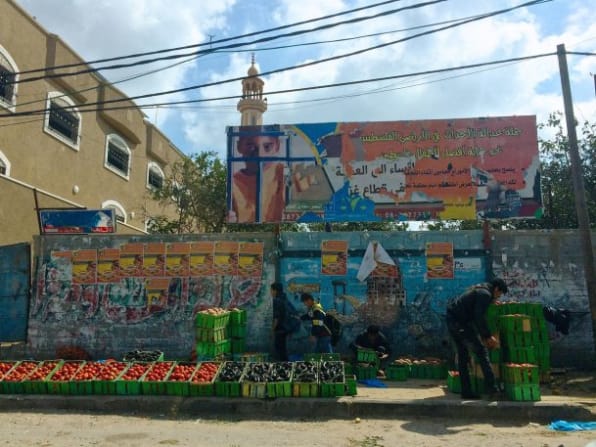
So instead Hammed’s customers, 95% of whom are female, order the notebooks online (for $ 2 to $ 5, depending on the size), and a local delivery service brings them to their door. Hammed has big dreams for his business, which launched in January, and many short-term barriers, like periodic shortages in the paper he needs. Still, in just two months he’s already repaid the money he borrowed from friends for initial startup costs. His most popular prints are of the galaxy, names, and the phrase “I want to travel” in Arabic, a statement about the near impossibility of mobility for most Gazans under siege.
Business through social media is “a natural development,” says Gaza-based Palestinian economist Omar Shaban, noting that despite having among the world’s highest unemployment rates, Palestinians in Gaza are highly educated. “Gazans are educated and connected to Israel and international markets, so they know what’s going on. Still, they are limited because of the situation, the blockade, the checkpoints, and difficulties in importing.”
Technology-related work is an increasingly common outlet for Gaza’s thousands of unemployed college graduates. Groups like the accelerator Gaza Sky Geeks and Gaza Gateway have pioneered outsourcing technology services to international companies and organizations. But inside Gaza, social media-based commerce and advertising are also creating new, albeit still limited and unmeasured, market opportunities, Shaban says.
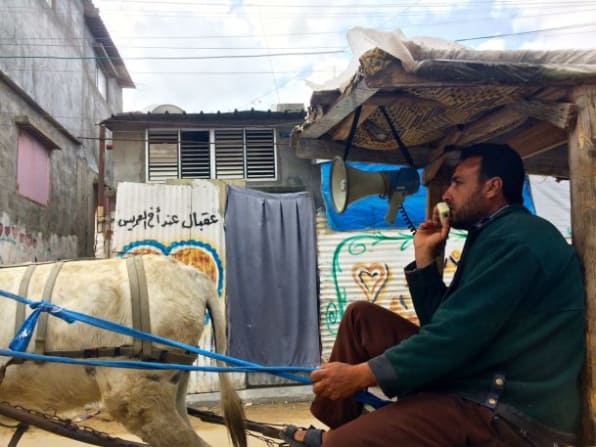
Amany El Kahlout, 24, launched her own insta-business this year selling imported goods and other daily products. The Arabic-English translator first used Instagram for fun to share pictures of her coffees and meals. Soon, she was gaining followers, who were asking her for recommendations and recipes. Recently, El Kahlout advertised her sister-in-law’s makeup skills on Instagram and 30 brides then went to her salon, El Kahlout says. Now she still posts beautiful food photos along with kitchen tools and decorations, among other items, that she imports from Israel, Turkey, and Palestinian cities in the West Bank.
“People start to like the idea of shopping from the home,” El Kahlout says. “And they’ve started to trust this. Because of the siege and the electricity problems, people started to like Instagram.”
El Kahlout has coveted family connections that can help bring the imports she sells. But it’s still not a reliable process, so she’s studying the market and looking for other options to keep her business plans profitable. She cites Saudi Instagram sensation Afnan al Batal, a social media “fashionista” who’s built a massive Instagram following and business advertising products, as one of her entrepreneurial role models.
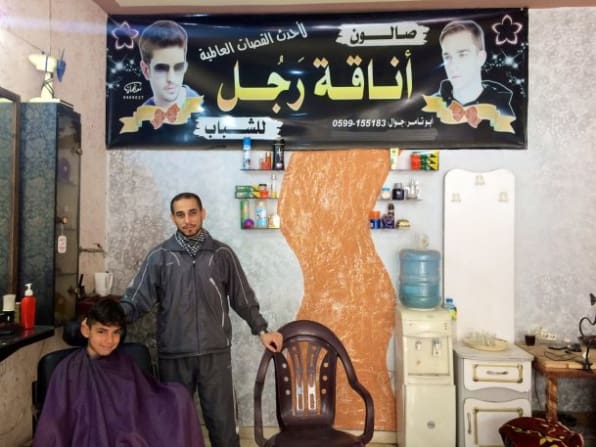
Ahmed Naim Tarabish, 31, a barber from Gaza’s Jabalia refugee camp, had a different inspiration: struggling to support his 13 family members. Along with a friend, he started a Facebook page for people to buy and sell second-hand goods, which are a core part of Gaza’s informal economy. Now the Facebook group has more than 23,000 members, who trade everything from electronics to agricultural animals. Other friends run similar sites for renting used cars and female clothes. For some, it’s their only form of employment; for others, one of many side hustles.
“In order to live we always have to find a substitute,” he says, of the importance of the second-hand market. Tarabish pays about $ 55 monthly to rent his salon, and estimates he makes anywhere from $ 80 to $ 100 monthly by refurbishing and reselling used electronics through his page.
Other Gazans are experimenting with new kinds of markets as they go. Ensaf Habib, 21, a journalism student, has a very popular Instagram account, with 103,000 followers. Many followers initially came for the reports about Palestinian life and history that she and friends compile and post from places all around Gaza. But it wasn’t long until that fame also drew the attention of companies and businesses in Gaza, which started to request advertisements for their products and services. The entrepreneurial student, always in need of extra money, agreed.
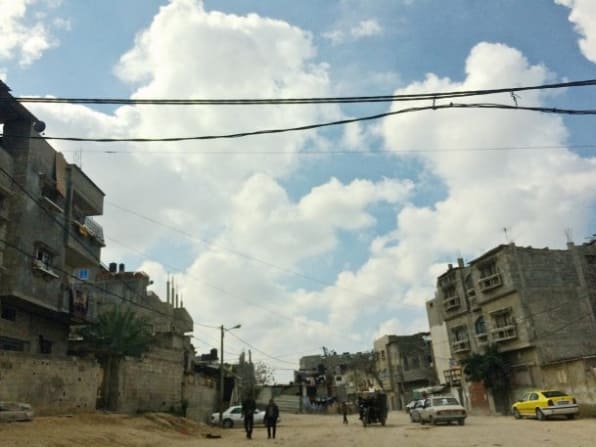
Now businesses, from pharmacies to furniture companies to restaurants, pay her about $ 13 a post–a small amount, she notes, because the practice of paying for online advertisements is still new to Gaza. She also advertises the accounts of lesser known businesses and products she likes for free. “Of course there’s no financial return, but it’s motivated by social responsibility,” she said.
It’s everyday resilience and creative victories like these that make life a little more manageable for besieged Gazans. But Hammed said Dftar’s initial success is also bittersweet because his brother isn’t here to see it.
Two years ago, Hammed’s brother joined the refugee trail, escaping to Egypt and boarding a boat headed to Italy in search of a safer life. The boat sank. Hammed’s family has heard nothing of his brother’s whereabouts since, but he hasn’t been able to confirm if his brother survived or not. Hammed wishes his brother, who first noticed how popular personalized notebooks were on the internet, could see how far they’ve come now.
“I hope that the project will expand and that my life will be more stable and that I can support my parents financially and make people happy,” he says.
(52)

